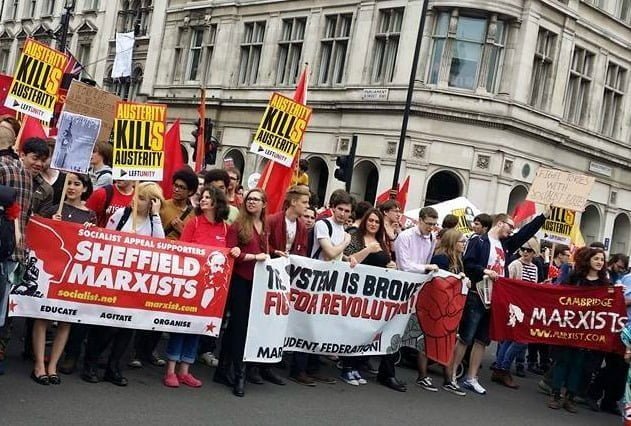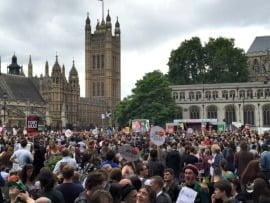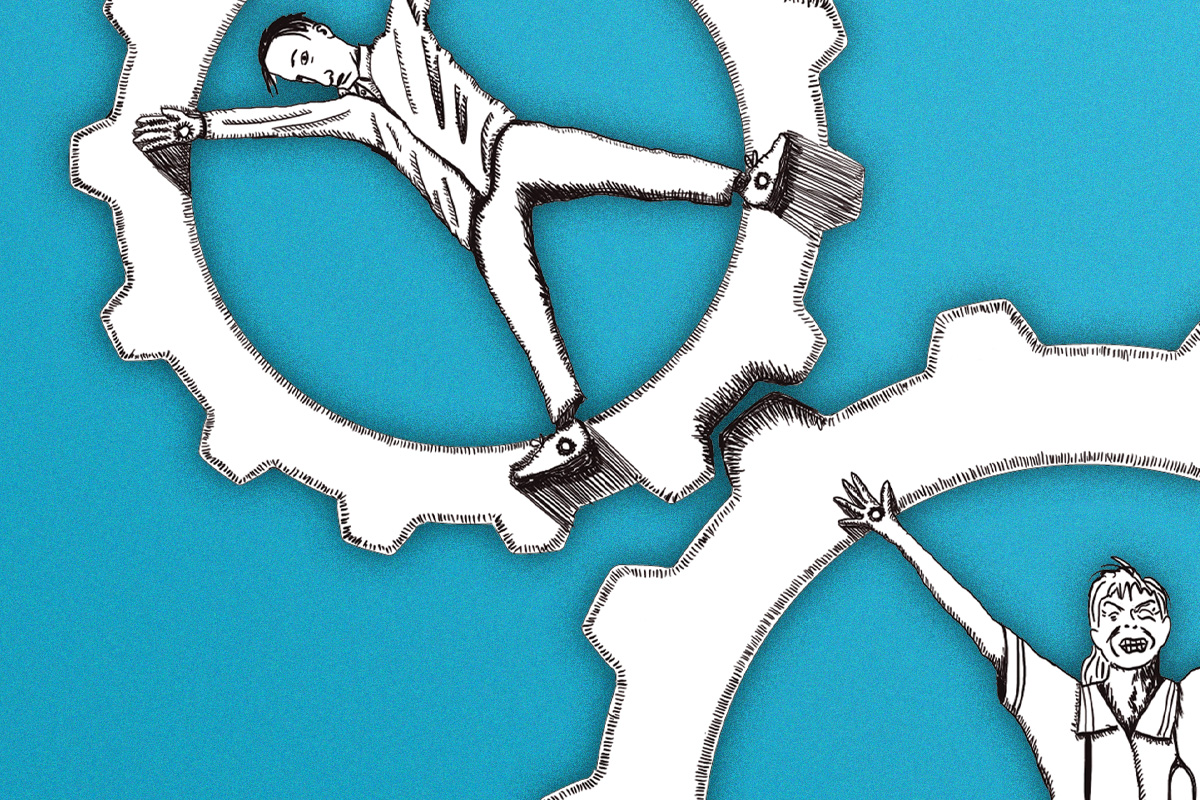Saturday’s End Austerity Now demonstrations defied all expectations. Police estimates for the London demonstration alone gave a figure of around 250,000, with likely numbers exceeding this. From the title of the protest to the placards on display and the slogans being shouted, the message was loud and clear: we reject your austerity!

Saturday’s End Austerity Now demonstrations defied all expectations. Prior to these events, the protest’s organisers, the People’s Assembly Against Austerity – a national coalition of local community campaigns, trade unions, and activist groups – had estimated that the attendance in London would be between 50,000 and 100,000. In the end, police estimates for the London demonstration alone gave a figure of around 250,000, with likely numbers exceeding this. Thousands more took to the streets in Liverpool and Glasgow. From the title of the protest to the placards on display and the slogans being shouted, the message was loud and clear: we reject your austerity!
A new generation
The People’s Assembly organised protest was the culmination of weeks of spontaneous demonstrations and local protests that have broken out in the wake of the surprise Tory victory in the 7th May general election. Indeed, the defining characteristic of the post-election period has been the militant and radical mood of anger everywhere – accumulating beneath the surface for years – that has erupted out into the open, with thousands protesting outside Downing Street in the immediate aftermath of the election, and thousands more demonstrating in cities across Britain against the Tories and austerity.
 The 20th June protest – starting symbolically in the City of London by the Bank of England and ending next to the Palace of Westminster in Parliament Square – was a potent and visible display of the radicalisation that has open up following the Tories’ election victory. Far from being demoralised and cowed into submission, ordinary people have remained defiant. This was clearly reflected on Saturday by the festival, carnival-like atmosphere of the demonstration, where there was a notably jubilant but defiant mood on display.
The 20th June protest – starting symbolically in the City of London by the Bank of England and ending next to the Palace of Westminster in Parliament Square – was a potent and visible display of the radicalisation that has open up following the Tories’ election victory. Far from being demoralised and cowed into submission, ordinary people have remained defiant. This was clearly reflected on Saturday by the festival, carnival-like atmosphere of the demonstration, where there was a notably jubilant but defiant mood on display.
Most notable was the enthusiasm and dynamism of tens of thousands of school students at Saturday’s demos, many of whom had made their own way there (from far afield) to attend their first ever big protest. It is clear that a whole new generation have been drawn into political activity on the basis of events, and this was their first opportunity to express their anger and desire for a radical change. Their entrance onto the scene of political activism has provided a welcome breath of fresh air, helping to galvanise the movement and provide new winds for its sails.
 These latest demonstrations were by far the largest in the past few years – only beaten in terms of size by the one-million-strong TUC “March for the Alternative” in 2011. Since then, with little to show for years of strikes and demonstrations, the TUC-led protests have diminished in size, and a certain sense of resignation has crept in at times. Many felt they were like the Grand Old Duke of York soldiers being marched up and down with no strategy or plan.
These latest demonstrations were by far the largest in the past few years – only beaten in terms of size by the one-million-strong TUC “March for the Alternative” in 2011. Since then, with little to show for years of strikes and demonstrations, the TUC-led protests have diminished in size, and a certain sense of resignation has crept in at times. Many felt they were like the Grand Old Duke of York soldiers being marched up and down with no strategy or plan.
In contrast, End Austerity Now was an incredibly vibrant demonstration, due – in the main – to the extremely large presence of radicalised and militant young people. It is these same radical youth who had led the way in the semi-spontaneous local protests that had broken out across the country in the recent period.
Trade unionists were present on Saturday in large numbers, and unions such as Unite, PCS, RMT, FBU, and others were out in force with sizeable blocs on the demonstration, as were many national campaigns over issues such as housing and the NHS. The Green Party and the Labour Assembly Against Austerity – promoting Jeremy Corbyn’s bid for Labour leader – were also highly visible. But it was the extraordinary turnout of young people who had turned up without any organisation that was the most dynamic force behind Saturday’s protest.
The system is broken
 Socialist Appeal supporters had a loud and notable presence at End Austerity Now. The latest paper, with its front page headline of “THE SYSTEM IS BROKEN: WE NEED A REVOLUTION!” was greeted with enthusiasm by others on the protest, as were slogans shouted such as “Kick out the Tories! Kick out Capitalism!”
Socialist Appeal supporters had a loud and notable presence at End Austerity Now. The latest paper, with its front page headline of “THE SYSTEM IS BROKEN: WE NEED A REVOLUTION!” was greeted with enthusiasm by others on the protest, as were slogans shouted such as “Kick out the Tories! Kick out Capitalism!”
Of particular note was the turnout of Marxist Students on the Revolutionary Students and Youth bloc. Gathering at the front of the demo behind a banner with the same slogan as the Socialist Appeal front page, a big gathering of young people marched together from Bank to Parliament, shouting revolutionary slogans along the way such as “Tory cuts are no solution – Britain needs a revolution!” Without doubt, this was the most energetic and vibrant of all blocs on the protest, as many commented. Indeed, so visible and lively was the bloc that many others from the surrounding crowd were drawn in during the course of the march.
At the same time, there was great interest amongst the whole crowd for the leaflets being distributed by Socialist Appeal comrades for this weekend’s REVOLUTION 2015 – a festival of Marxist ideas and revolutionary socialism being organised by the International Marxist Tendency and hosted by the UCLU Marxists.

In all, the protest showed that whilst hundreds of thousands present were united behind the demand to “End Austerity Now”, there are many thousands – particularly from the new generation of fresh activists – who are drawing explicitly revolutionary conclusions and are wanting to fight for a fundamental transformation of society.
Where next?
The protest’s radical and militant mood was also reflected by the response to the end of demo speeches, with the largest applause and biggest cheers being reserved for those – such as left-wing Labour leadership candidate Jeremy Corbyn and Coronation Street actress Julie Hasmondhalgh – who mentioned the word socialism. Meanwhile, Mark Serwotka, the general secretary of the PCS union, gained an enthusiastic response to his suggestion for a general strike.
Such examples demonstrate clearly that workers and youth are looking for a bold alternative; a clear answer to the question: which way forward? But whilst all the speakers were clear in echoing the sentiment of opposition to austerity, few gave any clue about what the alternative is or how to fight for it. With the exception of Mark Serwotka’s suggestions – for joint industrial action, and an appeal for everyone to sign up as an official Labour supporter in order to vote for Jeremy Corbyn – very little was offered by any of the main speakers, other than to tell the crowd what they already know: namely that austerity is bad, etc..
The fact that such a large and dynamic protest was seen is of course to be celebrated and should not be forgotten. The movement has clearly been reinvigorated, and Saturday’s tremendous turnout and mood will undoubtedly have given people confidence to organise and fight back against the Tories. But in order to move forward, a clear direction is necessary. If such direction is not given, then there is clear risk of confidence being undermined, as people see little to show from demonstration after demonstration, partial strike after partial strike, with no overall strategy of how to actually win.
 The key question in terms of direction is for the leadership of the movement to explain what the alternative to austerity is. It was clear from the speeches what everyone is against. Many contributions spoke about the need to oppose the cuts, tackle inequality, and redistribute the wealth in society. But nobody explained why these cuts are being made in the first place; why inequality has risen to such eye-watering levels; or how we can ensure that the wealth in society is used for the benefit of ordinary people.
The key question in terms of direction is for the leadership of the movement to explain what the alternative to austerity is. It was clear from the speeches what everyone is against. Many contributions spoke about the need to oppose the cuts, tackle inequality, and redistribute the wealth in society. But nobody explained why these cuts are being made in the first place; why inequality has risen to such eye-watering levels; or how we can ensure that the wealth in society is used for the benefit of ordinary people.
In the final analysis, the economic crisis was not caused merely by greedy bankers, and nor is austerity an ideological creation of the Tories. Both the crisis and the ensuing austerity flow from the laws and logic of the capitalist system and the anarchy of the market. The only alternative is to overthrow this system of private ownership and replace it with a rational, democratic plan of production. Only with the socialist transformation of society can we really end austerity. All talk of reforming capitalism is doomed to failure.
This is the bold socialist programme that is needed. This is the programme which the leaders of the movement should be demanding. This is the revolutionary programme that the Marxists are fighting for. We call on you to join us in this fight. We have nothing to lose but our chains. We have the world to win.







